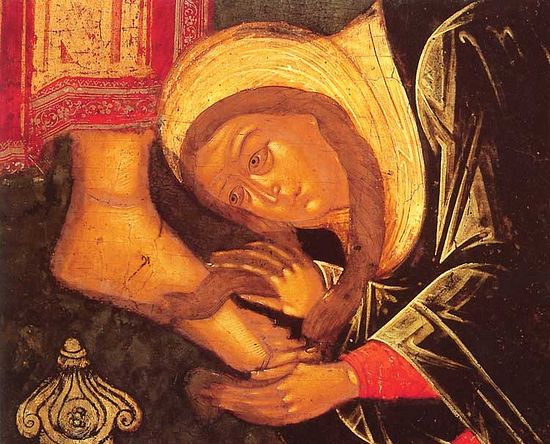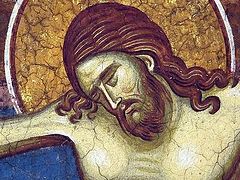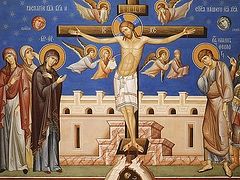Brothers and sisters this is the last Presanctified Liturgy for the year. We won’t have another one until Great Lent begins again if God grants us life next year. Today we commemorate the woman who anointed the Lord, preparing Him for His burial, and also Judas who betrayed the Lord. One was receiving her salvation because of her gratitude, and the other was finding perdition because of his addiction to sin, causing him to lose his mind, so that he would actually kill his friend, mentor, teacher, and God. There is a constant interplay between these people in the services, always personalizing them. In the Matins from last night, the Kontakion tells us how we should think of this woman’s repentance. We should personalize it—it should be about us:
I have transgressed more than the harlot, O loving Lord,
/
yet never have I offered Thee my flowing tears. /
But in silence I fall down before Thee /
and with love I kiss Thy most pure feet, /
beseeching Thee as Master to grant me remission of sins;
/
and I cry to Thee, O Savior: //
Deliver me from the filth of my works.
We see the spectacle of this woman’s love and gratitude. It’s more perfectly laid out in the Gospel of Luke, which we recently read, as it’s appointed for St. Mary of Egypt. There the Lord describes the woman saying she loved much and therefore she has been forgiven much, but to whom little is forgiven, the same loveth little. We are supposed to love much, and yet when we think of this woman, we don’t have tears to put upon the Lord’s feet, we don’t have deep tears of compunction, or if we do it’s seldom. You can think about that and become neurotic about it, or you can have the proper attitude about your lack of repentance and deep feeling—it’s a fact. You shouldn’t ignore it, but what you should do is exactly what is done in the Kontakion. Stating the facts, I have transgressed more than this harlot and yet I don’t have tears, but in silence I fall down before Thee. That means I beg for forgiveness and help.
And what father would not help his child? No matter what his child has done, if his child comes to him and says, “Papa, help me,” he will help. And we have the sure and certain understanding that if we ask our Father, if we ask our Lord to help us, He will help us. But we must come to Him with the right attitude, and the services especially teach us this attitude, which is lacking in other places where they proclaim the Lord Jesus. This sense of our sinfulness and humility concerning ourselves is always present in our services, but it’s also always present with hope. Hope is not just wishful thinking as the word has come to mean in our modern usage. The Christian meaning of hope is this joyous and also sorrowful expectation of what is to come. Not just belief, which has the idea that we think something is true, but knowledge—sure knowledge that the Lord will help us. This hope is a watchful and waiting expectation that the Lord will help us.
Holy Week especially is a time when we must try to change the way we think about things, the way we act about things. We take stock of ourselves and see that we’re not like this woman at all. We don’t have her repentance or compunction, and we see that we have more similarities to Judas than to this woman. And we look at the other characters of the Passion, such as St. Peter. He fell grievously and denied the Lord three times even though he boasted that he would never do such a thing. But what did he do after he denied? He wept bitterly, but he didn’t depart from the Lord. How could he do that? He’d been with Him for three years. He’d seen so many things, shared so many things, felt his heart turn and change when he was with the Lord. How could he leave Him even though he was a terrible sinner?
Conversely, Judas, who after he denied, sold, and gave a kiss to mark the Lord so that He would be judged, hanged himself. But he didn’t die from this hanging and his bowels gushed out and thereby he died. He didn’t repent. He was sorry but he didn’t repent, because sorrow is not repentance. Sorrow is the beginning of repentance. Repentance means is to change. Peter changed. Peter was renewed, and we see that when the Lord renewed him after the Resurrection when he said, Simon, son of Jonah lovest thou Me? And He said to him three times, Feed my lambs, feed my sheep, showing that He trusted him and that he could still carry on the work of the Lord.
We must cultivate in ourselves a feeling of repentance. It doesn’t come from conjuring it up, but from living the Christian life and struggling, falling and getting up, hearing the example of these holy people being expounded upon by the Holy Fathers and the services, and trying in some way to inculcate this in our life. God will help us. I find Great Lent and especially Holy Week to be a period when I am trying to change myself, although of course I can’t do this without God’s help. But he won’t do it without my effort. Begin the effort by saying honestly, “I am worse than the harlot and I am a lot like Judas, and I have denied the Lord many more than three times by the way I live and act, by the priorities I have, by the things I say, by the things I do.” That is the beginning. And if you have this feeling about yourself then the compunction will come.
Cultivate in yourselves this compunction. It doesn’t happen magically. It happens through effort and time. This is why it is so important to be part of our services as often as possible. And “possible” is a relative term. What seems impossible is really possible. Sometimes when we think it’s impossible to come to a service it’s because we don’t want to or we have prioritized something else. In my experience, sometimes we set the bar of “possible” way too high. It is possible to come to the services and struggle and try to acquire the mind that is being shown in them. This Kontakion is an example—recognizing that we are wretches and sinners, but in the same breath saying that we bow down before Thee and begging the Lord to help us. This is the essence of the Christian life—to know that we are sinners but that God will help us; and He will. May God help you to have this feeling.
If I can do only one thing in this life as a pastor it would be that somebody would understand this feeling that we must cultivate in ourselves, because the Lord says, You receive not because you ask not. How can we receive from God help regarding our sins if we don’t recognize them and ask Him for help? As pastors we must fight now this terrible climate in our world of license, and this idea that to say anything is wrong is somehow limiting and bigoted and negative and maybe even neurotic and a sign of mental illness. In the Christian life it is mental sobriety and wholeness to recognize that something is wrong with us. But there must always be hope in God. It’s when you recognize that something is wrong with you and you do not hope in God that you’re mentally ill. When you recognize that you are a sinner and with God’s help you can become righteous, then you are healthy and on your way to complete perfection. May God help you in all things. Amen.







